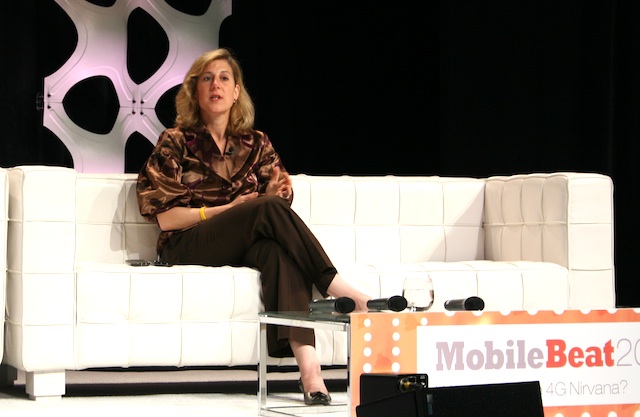
Google’s mobile payment strategy is just getting started, but that doesn’t faze Stephanie Tilenius, the company’s vice president of commerce.
“There’s going to be a ton of innovation in mobile payments,” Tilenius said Tuesday at VentureBeat’s MobileBeat 2011 conference in San Francisco.
“It’s sort of like 1999 was with e-commerce, with eBay and Amazon. We’re at the beginning of 10 years of innovation and competition,” she said.
Tilenius is responsible for Google Wallet, the company’s payment system, and Google Offers, a “daily deal” and loyalty program that beams coupons to customers based on their location and preferences. Google Offers launched Tuesday in New York and San Francisco, after a trial period in Portland, Ore.
Tilenius said that one Portland bistro saw its lunch traffic double after using Google Offers to promote itself.
Google has also recently launched Single Tap, a tool for making purchases by simply tapping your phone to a reader. Single Tap uses Near Field Communication (NFC) to wirelessly authenticate your credit card data stored in your phone. Google launched Single Tap with support from Citibank, but Google will eventually work with all the major banks in the credit card market, Tilenius said.
The company also recently acquired Punchd for a reported $10 million in order to beef up its mobile wallet and customer loyalty strategy.
About 15 percent of Android users already use a Google mobile app, Google Shopper, to get special offers, Tilenius said. Android has over 100 million users, so that would represent about 15 million people, although Tilenius said the actual number was “north of 5 million.”
In addition, she gave a glimpse of the company’s future roadmap for mobile payments. Google Wallet and Google Offers will be embedded in Google+, Tilenius said, as well as other Google properties such as Maps.
For online, non-mobile payments, Tilenius acknowledged that the company’s Google Wallet program is a relative latecomer to the scene.
“Paypal is doing fantastically online. We are behind in that,” Tilenius acknowledged.
But Google’s growing: Google Wallet now accounts for 25 percent of the Android market’s transactions, she said.
“80 percent of commerce is offline and local,” Tilenius said. Services, entertainment, restaurants and the like add up to a trillion-dollar industry, and Google clearly wants to own a piece of that.
Photo: Christopher Peri/VentureBeat

